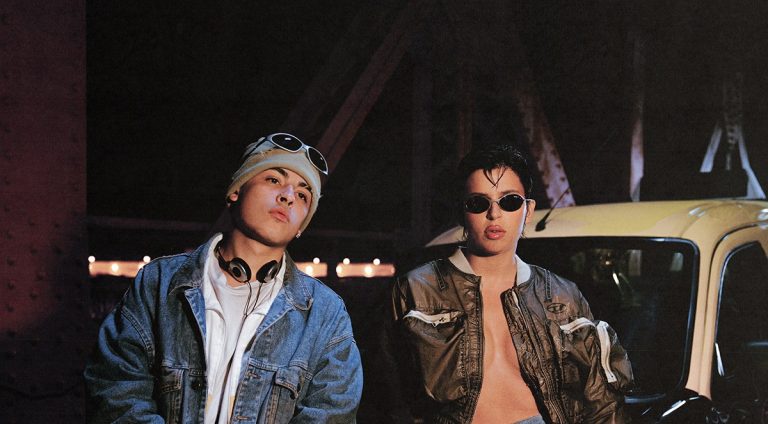
Argentinian pop welcomes a new era
20 June, 2024Argentinian pop has enjoyed a boom in the last few years, with the likes of Emilia, Nicki Nicole and Duki part of a new generation of artists now chart-topping in Spain and Latin America. Among Argentina’s young talent are previous collaborators, 22-year-old rapper Trueno and 29-year-old Nathy Peluso. In May both released highly awaited albums, just seven days apart. Nathy Peluso’s Grasa and Trueno’s El Último Baile mark dramatic departures for both artists and indicate the colourful, experimental “golden age” Argentinian pop can expect to enjoy.
In their rise to popularity, both Trueno and Nathy Peluso not only established themselves as talented artists, but also staked out space for their country within the global music scene: in their 2022 collaborative single “Argentina”, masterfully laced references to Buenos Aires, gauchos, Argentina’s indigenous peoples, Patagonia and Las Malvinas are laid over a thumping beat, traditional instrumentation and – of course – fierce patriotic pride. As individuals both Trueno and Nathy Peluso have explored national identity further in tracks such as “Tierra Zanta” and “Manifesto Freestyle” (Trueno) and “Buenos Aires” (Peluso), whose collective commercial success has catapulted the young musicians to near-icon status. The impression listening to each of their recent releases is of two young artists who, having firmly established and paid homage to their musical roots, are now ready to explore.
Trueno: El Último Baile (Sony Music Entertainment US Latin)
The 13-track record is a characteristically swaggering and rhythmic release from the Buenos Aires rapper, but, unlike previous albums, preoccupies itself less with exploring different themes – Trueno’s sophomore album Bien o Mal explored dictatorship, police brutality and Latin American identity – and more with exploring new musical terrain. The album leaps playfully between genres, including some new to Trueno, such as the jangly techno beat on “Cuando El Bajo Suena” and the R&B, faintly Afrobeats-inspired love song “Real Gangsta Love”. Trueno’s voice inhabits new forms as he opts for occasional melodic vocals instead of his characteristic conversational rap delivery. High points include the irresistibly joyful disco anthem, “Ohh Baby”, whose seventies-inspired piano and bouncy strings suit the rapper unexpectedly well, and the other single “Tranky Funky”, full of shoutouts to Trueno’s West Coast hip-hop icons.
If there is one qualm with this album, it might be why the self-proclaimed “face of his country’s youth” sings so often in effortful English (some lyrics like “No Cap, real facts, smoke weed, hip hop and fuck it up” are in danger of falling flat). However, as much as Trueno strays into new musical territory here, his takes on different genres are consistently unique: melodies never stale as frequent beat-switches give tracks new dimensions midway through, and when the album ventures into reggaeton, lyrics are refreshingly romantic rather than falling victim to the genre’s overwrought misogynistic tendencies. Some may be disappointed that El Último Baile does not contain the same political or poetic touchstones as its ground-breaking predecessor, Bien o Mal, but if the aim of Trueno’s first albums was a stylistic and thematic culmination of all that makes up Argentinian music, now he wants to take it somewhere new. Trueno’s previous albums representing his country and La Boca called on Latin America and the rest of the world to listen; now, he wants us dancing.
Nathy Peluso: Grasa (Sony Music Entertainment España)
While also a departure from the artist’s previous projects, unlike El Último Baile Nathy Peluso’s new album requires no more than a single listen to recognise it as a ground-breaking and masterful work. The 16-track record, which features video accompaniment to every song, is sprawling and yet tightly tied together, with every distinctive song and video a goldmine for musical and lyrical analysis. Nathy Peluso is characteristically theatrical and chameleon-like: songs such as “Correlone” and “Envidia”, on which she sings “This ambition is killing me” and “I was born to win” with vocals sailing over slowly rattling tango drumlines and blaring horns, see her as a femme fatale emerging from another point in time. At other points in the album, where Peluso leans into the experimental trap that helped her make her name, she is snarling and formidable, the songs shaking with the force of her yells. The boyish swagger of her rap – with its unselfconscious ad libs mimicking whooping birds, revving engines or machine guns – renders enough vocal power to resemble a female, Latin American Kendrick Lamar. The album, however, is simultaneously full of unmistakeable Peluso trademarks, such as the moment during “Aprender A Amar” when she snarls “You need to learn to love yourself, bitch” at her reflection. The album’s crowning moments arrive with “Real”, dark and seductive reggaeton like you’ve never heard it before, and “La Presa”, a vibrant salsa song addressed to a police officer in which Peluso confesses to murdering her lover.
Grasa sees Peluso as more than a commanding show-woman, though: the album’s quieter moments are some of its most memorable, such as the sweet guitar song “El Día Que Perdí Mi Juventud” and the album’s closer, a tender dedication to Peluso’s mother named simply “Mamá”. From Brazilian funk to love ballads, Peluso inhabits every genre with the self-assurance and originality of an artist truly entering her prime.
Both Trueno and Nathy Peluso are trailblazers of Latin American music who defiantly refuse recognition; their respective albums marking the maturity and experimentalism of Argentina’s new musical generation. El Último Baile and Grasa are dynamic and self-realised projects, each a culmination of different genres and a determined step towards Argentina’s new musical future.
Follow Sounds and Colours: Facebook / Twitter / Instagram / Mixcloud / Soundcloud / Bandcamp
Subscribe to the Sounds and Colours Newsletter for regular updates, news and competitions bringing the best of Latin American culture direct to your Inbox.

